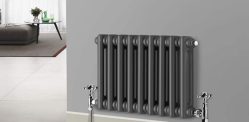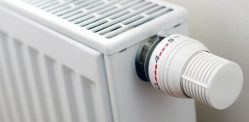“Over time sludge can build up in your system"
The performance of central heating systems, particularly radiators, is susceptible to a build-up of thick, hardened sludge over time.
If unattended, you could discover that your boiler needs to work harder to heat your home, which could result in a 25% increase in heating bills.
Many households do not think about the cleanliness or quality of their central heating water.
But the truth is that it might be costing them hundreds of pounds annually.
Families are searching for quick, simple and efficient solutions to reduce their energy costs as the cost of living continues to climb.
Sam Price, the founder of Heatable and a leading authority on heating, says cleaning radiators could reduce heating costs by 25%.
According to research by Enertek International, sludge in your system might “raise your heating expenditures by as much as 25%”.
Sludge is primarily a mixture of dirt particles and rust (iron oxide) fragments that come loose from the piping, radiators and soldered connections.
Therefore, the likelihood of the system having some sludge build-up increases with the system’s lifetime.
Rust and dirt come together to form a sticky liquid. Some of the particles settle and gather when this combination moves through the central heating system’s parts.
Over time, sludge can block the system to the point that radiator heat is uneven, the radiators don’t function correctly, or the radiators don’t heat up at all.
Sam says that although sludge might seem like a small issue, it can lead to “larger concerns” and render a heating system “much more inefficient”.
He explained: “Sludge slows down the system, reducing its efficiency and increasing your energy bills.
“Over time sludge can build up in your system, which is the result of rust and debris.
“Among the problems associated with sludge accumulation is that it can disrupt water circulation, leading to cold spots in radiators and reduced heat output.
“Cold spots on the radiator, cold radiator bottom, and the radiator taking an exceptionally long time to heat up are all signs of a system with sludge.
“It’s not just decreased efficiency that’s a concern of dirty central heating water either.
“Poor quality heating water is one of the leading causes of boiler breakdowns in the UK and is commonly responsible for the corrosion of key components such as the heat exchanger.”
How to resolve sludge in radiators?
The good news is that using a standard “power flush” to clean unclean heating water is “very easy to remedy”, according to experts.
A power flush is simply a thorough, vigorous cleaning of your heating system using water and a mixture of chemicals.
To guarantee the water quality of heating systems is kept to a “high standard” and help “prevent damage” to metallic components, as well as the formation of clogs.
A power flush (or any flush, for that matter) should preferably be carried out every five to six years.
It’s probably time to think about a power flush sooner rather than later if it’s been more than five years since your last one.
Anyone who suspects that sludge is clogging their radiators should contact a Gas Safe qualified engineer to have a check.
An engineer can be found on the Gas Safe Register’s website.
The engineer will attach a machine to your system if a power flush is necessary then a strong liquid flow at low pressure will be forced through your system.
Sludge and rust are removed from your boiler and radiators as a result of this.
Flushing a radiator system might take many hours and if there is a lot of sludge or you have a bigger system, it can take much longer.
Following a power flush, a central heating system will be filled with fresh, clean water.
The engineer will typically add an inhibitor solution.
This liquid chemical will prevent new sludge accumulation.
With the cost of living affecting many UK households, it is important to check you are not paying unnecessary amounts on your energy bills.
This includes making sure your heating system is working efficiently.






























































